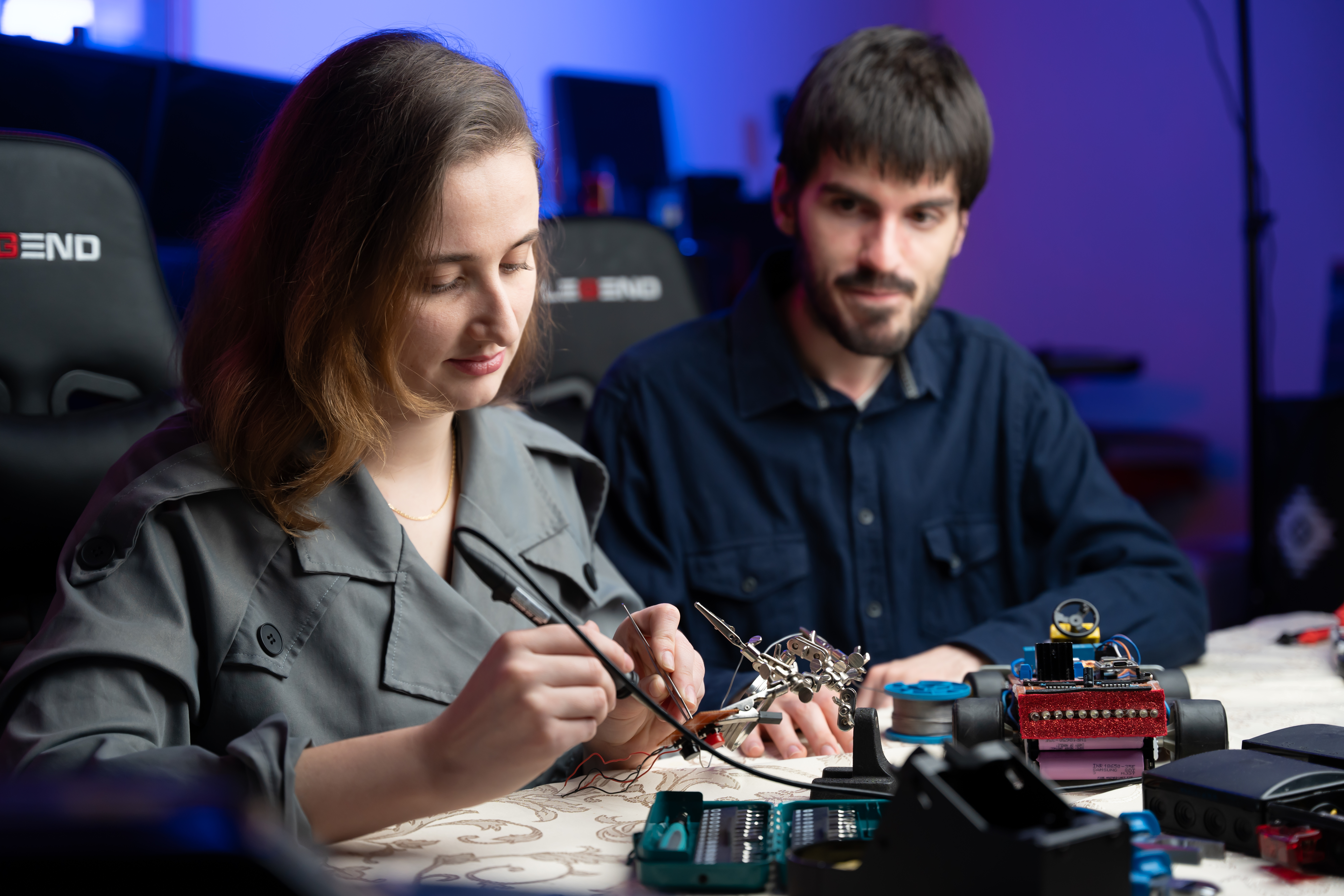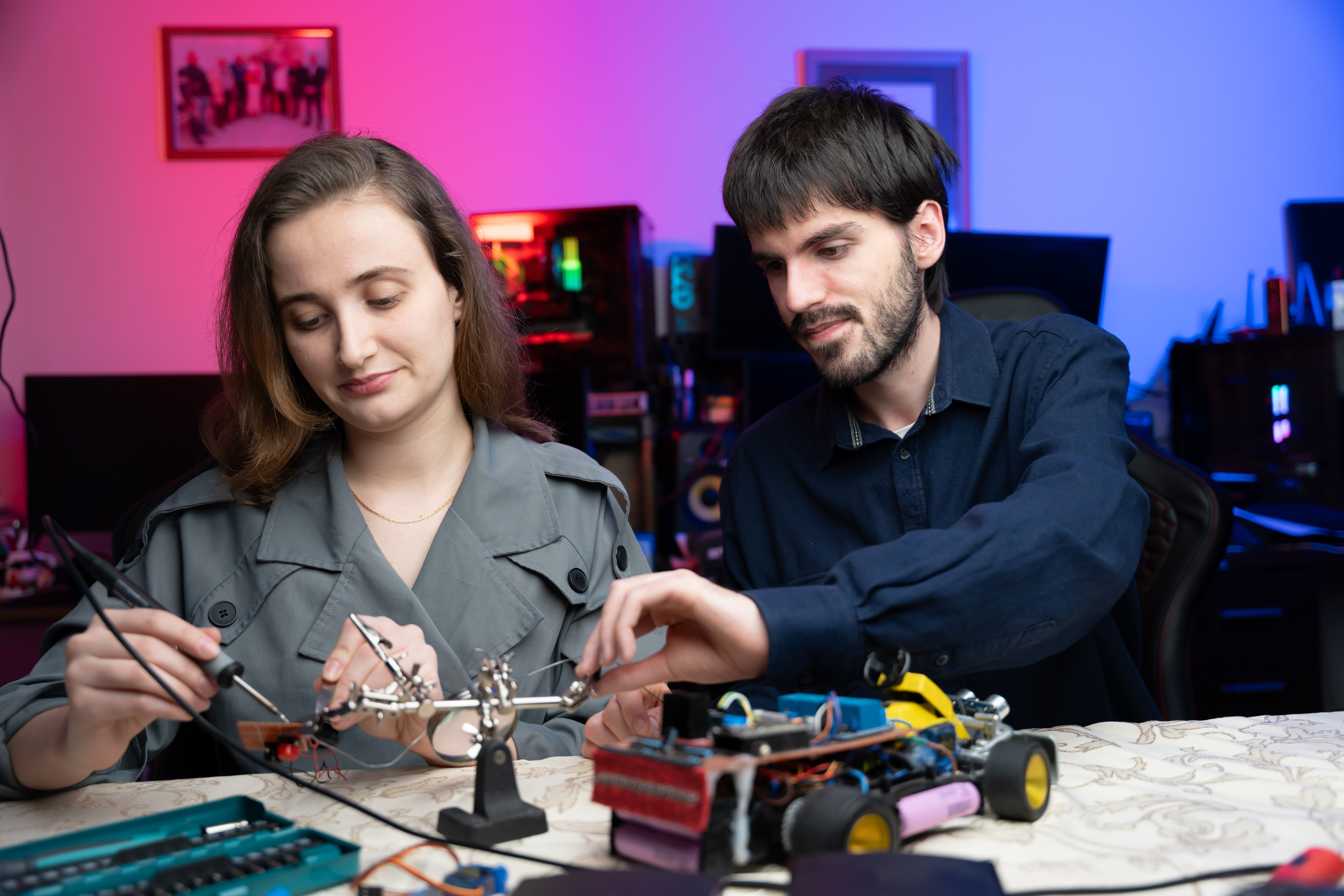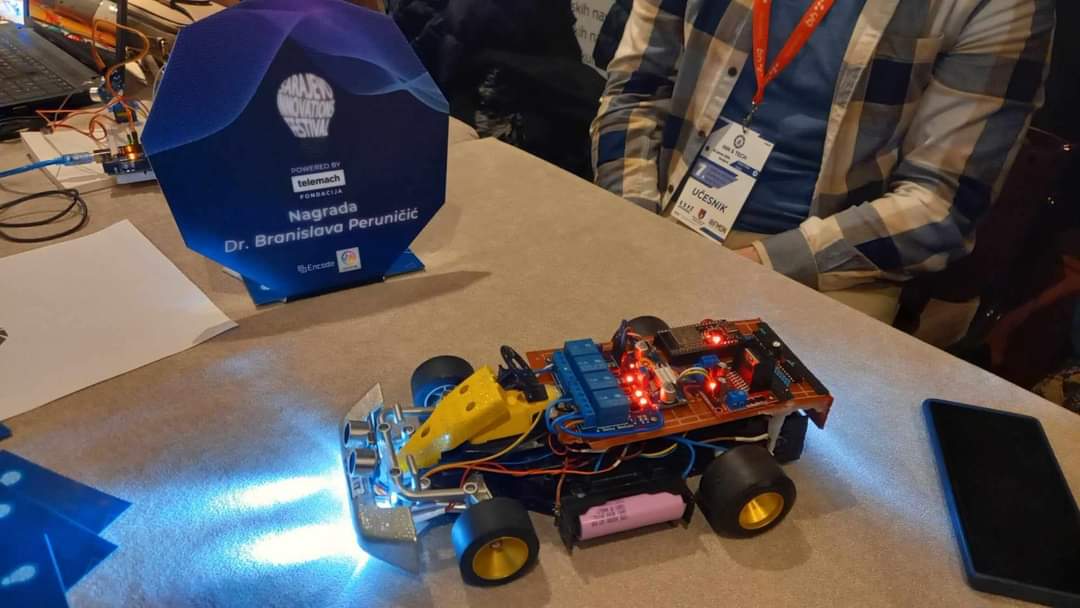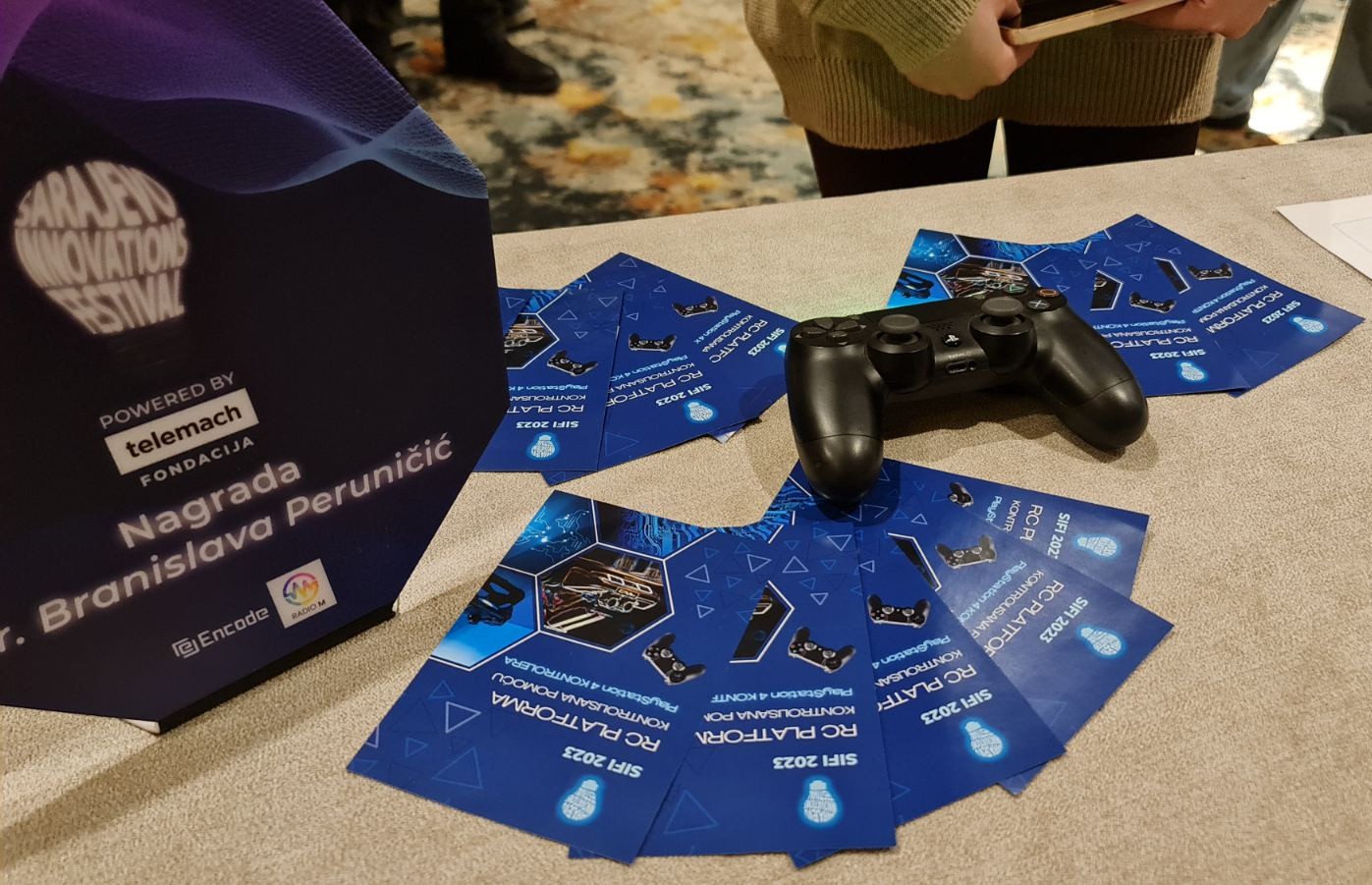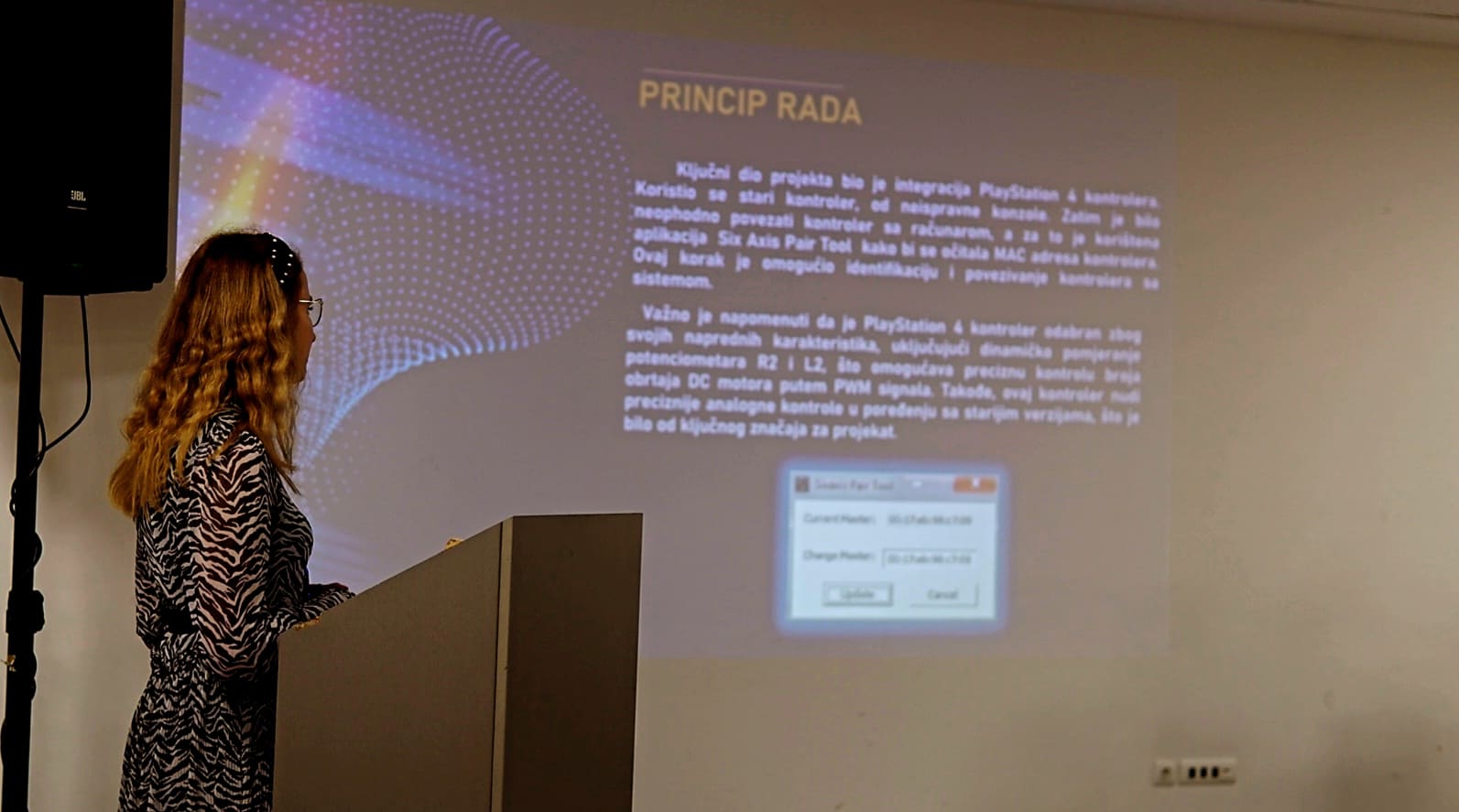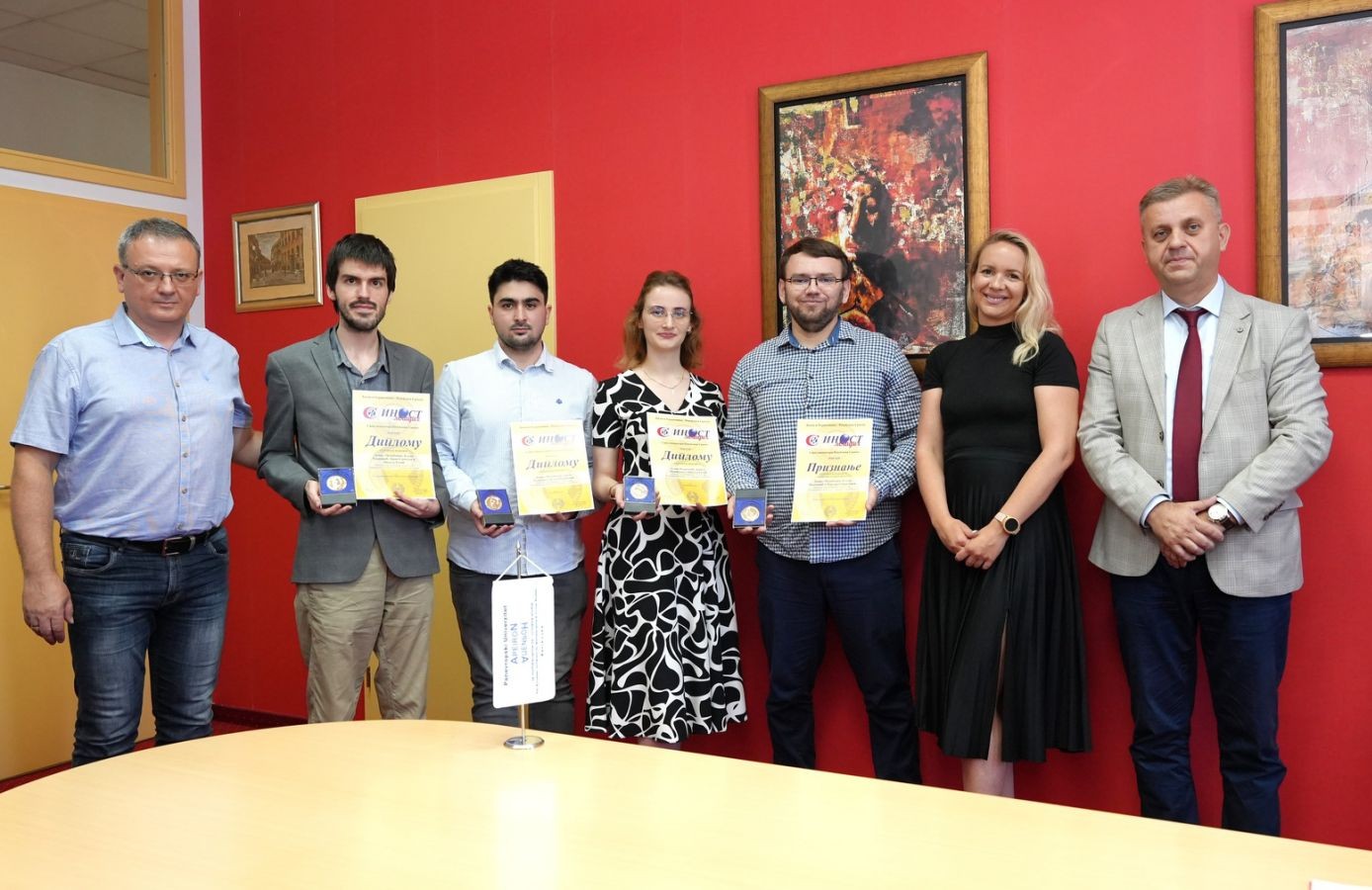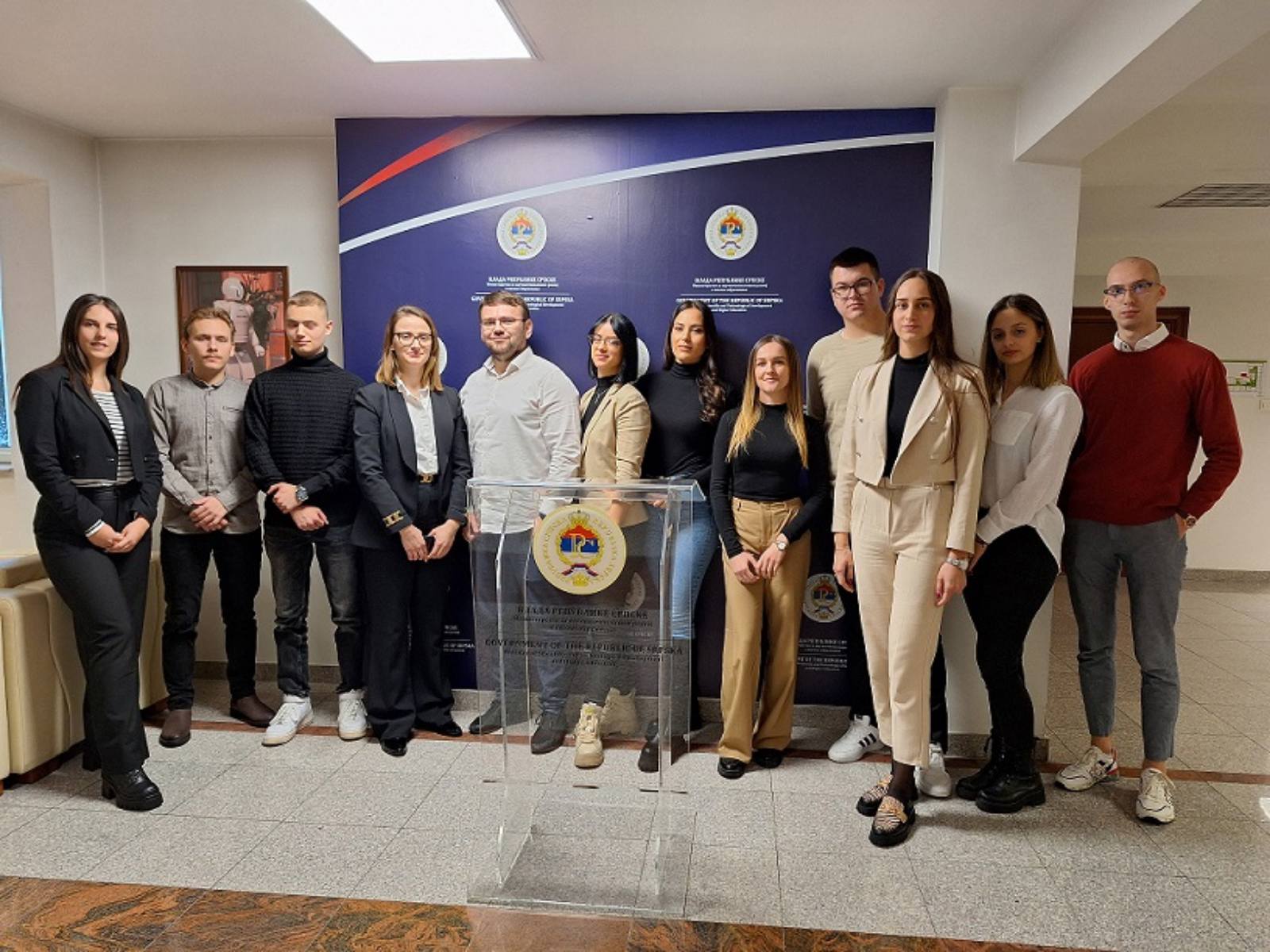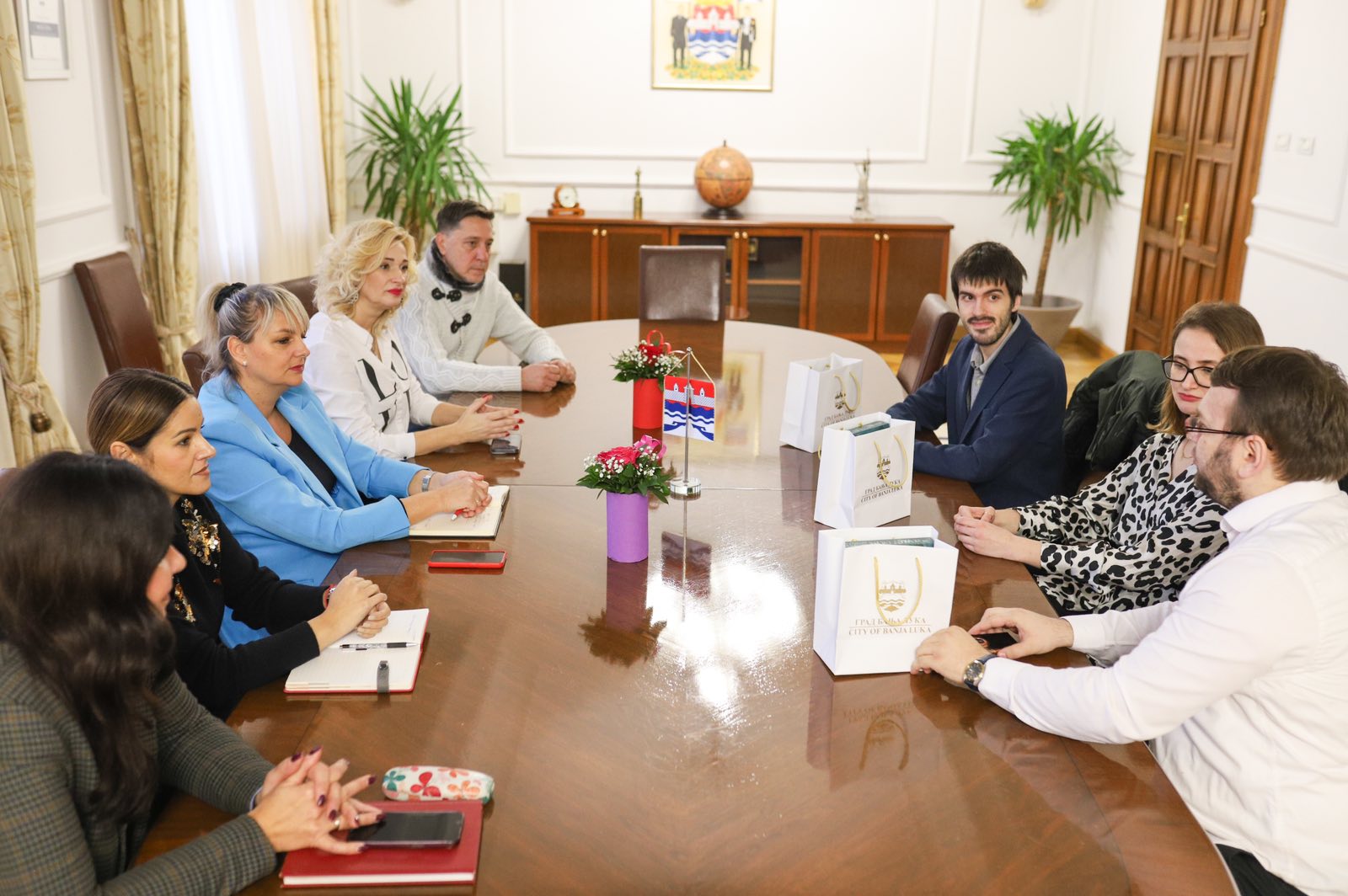Prioritising the places and people that need it the most
RC LearnMate: Empower, Include, Inspire
RC LearnMate: Empowering children with developmental challenges and educating future innovators.
RC Learn Mate is an innovative platform that combines assistive technology and education, helping children with developmental disabilities improve fine motor skills, spatial orientation, and digital competencies. Using a radio-controlled vehicle with haptic feedback, it enhances motor skills, self-confidence, and environmental awareness. Beyond assistance, RC Learn Mate enables elementary and high school students to learn programming and STEM skills through hands-on experience in technology.
Bosnia and Herzegovina
Local
The project is currently being developed and tested in Banja Luka, Bosnia and Herzegovina. Extensive prototype testing has already been conducted in various institutions across the city, including the Association of Innovators, and the Apeiron Scientific Research Institute, with the support of local companies and the Ministry of Scientific and Technological Development. The project was awarded at the 'Best Technological Innovation' competition, organized in collaboration with the Republic of Serbia, where it was recognized and presented as having immense potential. Additionally, the Mayor of Banja Luka, Draško Stanivuković praised the project at the Innovators and Investors Fair, emphasizing his appreciation for young people striving for a better future for all of us.
It addresses urban-rural linkages
It refers to other types of transformations (soft investment)
Prototype level
No
No
As an individual partnership with other persons/organisation(s)
RC Learn Mate is an interactive radio-controlled (RC) platform designed to support children with developmental disabilities by facilitating sensory integration, motor exercises, and hands-on learning. Using sensors, vibrations, and light signals, children develop spatial awareness, coordination, and problem-solving skills while intuitively controlling the vehicle and navigating obstacles.
The platform is primarily used on 3D-printed maps, offering a safe and engaging environment where children develop fine motor skills and independence through therapeutic activities. It can also be used outdoors, enhancing motor and cognitive abilities in a natural setting under supervision.
Beyond its assistive role, RC Learn Mate is a powerful educational tool for elementary and high school students, introducing them to robotics, programming, and STEM principles. Through real-world challenges, students develop critical thinking, creativity, and problem-solving skills, learning to use technology as a tool for innovation and practical solutions.
A companion application is in development, enabling real-time progress tracking for parents and therapists. It records key data, analyzes development, and personalizes learning, ensuring systematic skill-building and greater independence. A dedicated section for schools, innovation centers, and programming institutions will provide guides, tutorials, and courses, encouraging young innovators to engage in hands-on STEM learning and project development.
Recognized by leading institutions, RC Learn Mate has been tested and supported by the Association of Innovators, the Union of Innovators of Banja Luka, and the Apeiron Scientific Research Center. It was also awarded by the Ministry of Scientific and Technological Development in the "Best Technological Innovation" competition, where it was highlighted as a project with exceptional potential for education, inclusion, and technological advancement.
The platform is primarily used on 3D-printed maps, offering a safe and engaging environment where children develop fine motor skills and independence through therapeutic activities. It can also be used outdoors, enhancing motor and cognitive abilities in a natural setting under supervision.
Beyond its assistive role, RC Learn Mate is a powerful educational tool for elementary and high school students, introducing them to robotics, programming, and STEM principles. Through real-world challenges, students develop critical thinking, creativity, and problem-solving skills, learning to use technology as a tool for innovation and practical solutions.
A companion application is in development, enabling real-time progress tracking for parents and therapists. It records key data, analyzes development, and personalizes learning, ensuring systematic skill-building and greater independence. A dedicated section for schools, innovation centers, and programming institutions will provide guides, tutorials, and courses, encouraging young innovators to engage in hands-on STEM learning and project development.
Recognized by leading institutions, RC Learn Mate has been tested and supported by the Association of Innovators, the Union of Innovators of Banja Luka, and the Apeiron Scientific Research Center. It was also awarded by the Ministry of Scientific and Technological Development in the "Best Technological Innovation" competition, where it was highlighted as a project with exceptional potential for education, inclusion, and technological advancement.
Assistive Technology
STEM Education
Human-Computer Interaction (HCI)
Motor & Cognitive Development
Inclusion & Accessibility
Over the years, UNICEF Bosnia and Herzegovina, in collaboration with the European Union, has worked to promote social inclusion and education for children with developmental difficulties. Through various programs, UNICEF has emphasized the importance of equal opportunities, aligning perfectly with RC Learn Mate, which integrates assistive technology, inclusive education, and STEM learning to support children with disabilities.
Bridging the gap in assistive education:
Between 2015 and 2017, UNICEF Bosnia and Herzegovina enabled 3,000 children with disabilities to access early intervention services, while 675 children gained inclusive education. Despite progress, many families still lack access to assistive technologies.
RC Learn Mate aims to bridge this gap by providing a personalized learning tool that enhances motor skills, digital literacy, and access to inclusive education.
Ensuring long-term relevance:
Beyond temporary support, RC Learn Mate is designed as a sustainable and adaptable platform. It follows a bottom-up approach, where parents, therapists, and educators actively shape its content and features. Their feedback ensures continuous refinement, making it a resilient and flexible assistive technology for education.
Circular design and sustainability:
RC Learn Mate integrates modular design, recyclable materials, and energy-efficient components, extending its lifespan while reducing technological waste. Currently in the testing phase, it focuses on 3D-printed models that are engaging, intuitive, and eco-friendly, produced using the Creality K2+ 3D printer for customization based on user needs.
Open knowledge and community impact:
Following the principle of open knowledge sharing, RC Learn Mate connects educators, therapists, and innovators to spread best practices in STEM education and assistive technology. With strong support from companies, organizations, and government institutions, the project continues to grow and evolve.
Bridging the gap in assistive education:
Between 2015 and 2017, UNICEF Bosnia and Herzegovina enabled 3,000 children with disabilities to access early intervention services, while 675 children gained inclusive education. Despite progress, many families still lack access to assistive technologies.
RC Learn Mate aims to bridge this gap by providing a personalized learning tool that enhances motor skills, digital literacy, and access to inclusive education.
Ensuring long-term relevance:
Beyond temporary support, RC Learn Mate is designed as a sustainable and adaptable platform. It follows a bottom-up approach, where parents, therapists, and educators actively shape its content and features. Their feedback ensures continuous refinement, making it a resilient and flexible assistive technology for education.
Circular design and sustainability:
RC Learn Mate integrates modular design, recyclable materials, and energy-efficient components, extending its lifespan while reducing technological waste. Currently in the testing phase, it focuses on 3D-printed models that are engaging, intuitive, and eco-friendly, produced using the Creality K2+ 3D printer for customization based on user needs.
Open knowledge and community impact:
Following the principle of open knowledge sharing, RC Learn Mate connects educators, therapists, and innovators to spread best practices in STEM education and assistive technology. With strong support from companies, organizations, and government institutions, the project continues to grow and evolve.
RC Learn Mate – Empowering independence, learning, and inclusion
RC Learn Mate is designed with a strong focus on aesthetics and user experience, ensuring that interaction with the platform is intuitive and engaging. The project combines functional and aesthetic elements to create an immersive experience that promotes learning, skill development, and inclusion. Currently, the primary focus is on refining the prototype, but significant efforts are also being invested in the design to ensure that the final product meets the highest aesthetic and functional standards while remaining accessible to all users.
The platform’s aesthetic approach is based on a minimalist and intuitive design that prioritizes ease of use. The interface will be visually clean and accessible to a diverse range of users, featuring colors that enhance concentration and motivation without overwhelming the senses. The shapes of interactive elements will be ergonomic and comfortable to handle, making usage easier, especially for children with developmental difficulties. The design will also ensure a smooth, frustration-free experience, keeping children engaged and motivated.
The tactile quality is equally important, so materials will be carefully selected to provide an optimal sensory experience. The components will be made from durable, high-quality materials that ensure longevity and resistance to wear. Haptic feedback and interactive prompts will enhance user engagement, enabling dynamic learning through physical interaction while reducing screen dependency. The thoughtful selection of textures and responsiveness will make interaction more engaging and stimulating, further improving motor skill development.
RC Learn Mate not only encourages active interaction but also promotes inclusivity, adapting to various environments—including schools, therapy centers, and home settings. Its design will ensure universal accessibility, allowing customization based on individual user needs.
RC Learn Mate is designed with a strong focus on aesthetics and user experience, ensuring that interaction with the platform is intuitive and engaging. The project combines functional and aesthetic elements to create an immersive experience that promotes learning, skill development, and inclusion. Currently, the primary focus is on refining the prototype, but significant efforts are also being invested in the design to ensure that the final product meets the highest aesthetic and functional standards while remaining accessible to all users.
The platform’s aesthetic approach is based on a minimalist and intuitive design that prioritizes ease of use. The interface will be visually clean and accessible to a diverse range of users, featuring colors that enhance concentration and motivation without overwhelming the senses. The shapes of interactive elements will be ergonomic and comfortable to handle, making usage easier, especially for children with developmental difficulties. The design will also ensure a smooth, frustration-free experience, keeping children engaged and motivated.
The tactile quality is equally important, so materials will be carefully selected to provide an optimal sensory experience. The components will be made from durable, high-quality materials that ensure longevity and resistance to wear. Haptic feedback and interactive prompts will enhance user engagement, enabling dynamic learning through physical interaction while reducing screen dependency. The thoughtful selection of textures and responsiveness will make interaction more engaging and stimulating, further improving motor skill development.
RC Learn Mate not only encourages active interaction but also promotes inclusivity, adapting to various environments—including schools, therapy centers, and home settings. Its design will ensure universal accessibility, allowing customization based on individual user needs.
The project is built on the foundation of inclusivity, aiming to enhance educational accessibility and social integration. RC Learn Mate is designed to create equal learning opportunities for both children with developmental difficulties and primary and secondary school students, providing them with tailored support in different aspects of learning and development.
For children with developmental difficulties, the platform is specifically designed to enhance motor skills, coordination, and cognitive abilities. Through interactive activities that combine physical interaction, haptic feedback, and sensory stimulation, children can improve precision of movement, hand-eye coordination, and spatial orientation. Simplified controls and an ergonomic design ensure easy use and accessibility for users with different motor challenges, encouraging their active participation in the learning and development process.
For primary and secondary school students, RC Learn Mate serves as an advanced educational tool for learning programming, robotics, and automation. Through structured courses and hands-on projects, students develop logical thinking, algorithmic problem-solving, and gain fundamental knowledge of digital systems. The platform equips them with valuable STEM skills through an interactive and engaging learning process adapted to their age and skill level.
Additionally, we are committed to expanding education and raising awareness about the importance of inclusivity in technology and education. Through workshops, specialized training, and public campaigns, we strive to ensure equal access to digital and technological skills for all students, regardless of their individual abilities.
Beyond individual learning, RC Learn Mate fosters collaboration and teamwork by encouraging group activities where students of different skill levels and backgrounds work together to solve challenges.
For children with developmental difficulties, the platform is specifically designed to enhance motor skills, coordination, and cognitive abilities. Through interactive activities that combine physical interaction, haptic feedback, and sensory stimulation, children can improve precision of movement, hand-eye coordination, and spatial orientation. Simplified controls and an ergonomic design ensure easy use and accessibility for users with different motor challenges, encouraging their active participation in the learning and development process.
For primary and secondary school students, RC Learn Mate serves as an advanced educational tool for learning programming, robotics, and automation. Through structured courses and hands-on projects, students develop logical thinking, algorithmic problem-solving, and gain fundamental knowledge of digital systems. The platform equips them with valuable STEM skills through an interactive and engaging learning process adapted to their age and skill level.
Additionally, we are committed to expanding education and raising awareness about the importance of inclusivity in technology and education. Through workshops, specialized training, and public campaigns, we strive to ensure equal access to digital and technological skills for all students, regardless of their individual abilities.
Beyond individual learning, RC Learn Mate fosters collaboration and teamwork by encouraging group activities where students of different skill levels and backgrounds work together to solve challenges.
RC Learn Mate is a community-driven project that actively involves children, parents, educators, therapists, and innovators in its development. Their participation ensures that the platform truly meets the needs of diverse users—from children with developmental difficulties to mainstream students learning STEM skills.
1) Empowering children through inclusive learning
By making assistive technology and education accessible, RC Learn Mate directly contributes to the development of critical thinking, problem-solving, and technical skills in children. Children with developmental difficulties actively participate in testing, providing feedback on usability and engagement. Their insights help refine motor skill exercises, sensory functions, and the user interface, ensuring that the platform truly meets their needs.
2) Strengthening inclusive communities
Inclusion is at the heart of RC Learn Mate, and its development relies on community collaboration. Parents, therapists, and teachers work together in testing and development, making the platform an effective tool for breaking social barriers. By encouraging collaborative learning, the project strengthens community ties and promotes empathy, understanding, and teamwork.
3) Enhancing education and workforce readiness
RC Learn Mate has been co-developed with educators, who provide feedback on its integration into curricula and STEM education. With input from schools and technology experts, the platform enables students to acquire valuable skills in programming, robotics, and automation. As digital literacy becomes increasingly essential, RC Learn Mate helps prepare future generations for careers in technology, engineering, and innovation, contributing to the growth of the global workforce.
4) Driving technological and social innovation
The project fosters innovation through collaboration with research institutions, technology development teams, and accessibility experts.
1) Empowering children through inclusive learning
By making assistive technology and education accessible, RC Learn Mate directly contributes to the development of critical thinking, problem-solving, and technical skills in children. Children with developmental difficulties actively participate in testing, providing feedback on usability and engagement. Their insights help refine motor skill exercises, sensory functions, and the user interface, ensuring that the platform truly meets their needs.
2) Strengthening inclusive communities
Inclusion is at the heart of RC Learn Mate, and its development relies on community collaboration. Parents, therapists, and teachers work together in testing and development, making the platform an effective tool for breaking social barriers. By encouraging collaborative learning, the project strengthens community ties and promotes empathy, understanding, and teamwork.
3) Enhancing education and workforce readiness
RC Learn Mate has been co-developed with educators, who provide feedback on its integration into curricula and STEM education. With input from schools and technology experts, the platform enables students to acquire valuable skills in programming, robotics, and automation. As digital literacy becomes increasingly essential, RC Learn Mate helps prepare future generations for careers in technology, engineering, and innovation, contributing to the growth of the global workforce.
4) Driving technological and social innovation
The project fosters innovation through collaboration with research institutions, technology development teams, and accessibility experts.
RC Learn Mate thrives on a strong network of stakeholders across education, technology, research, and the community. These partnerships ensure continuous development, real-world testing, and adaptation based on user experiences.
1) Integration in education & innovation programs
The Association of Innovators of Banja Luka and the Union of Innovators have integrated RC Learn Mate into programming courses, enabling students to apply coding, robotics, and automation skills in hands-on projects. This real-world approach enhances problem-solving abilities and prepares students for STEM careers.
2) Application in scientific research & adaptive learning
The Apeiron Scientific Research Institute incorporates RC Learn Mate into studies on assistive technology, digital accessibility, and adaptive learning. These research programs evaluate the platform’s impact on children with diverse learning needs, ensuring an evidence-based approach to continuous improvement.
3) Parent feedback & real-world testing
Parents of children with special needs play a crucial role in refining RC Learn Mate. Their active testing provides key insights into how the platform:
* Supports motor skills and cognitive development.
* Enhances engagement, independence, and confidence.
* Requires further personalization for specific learning needs.
By integrating real-life experiences, RC Learn Mate remains user-centered, flexible, and continuously evolving.
4) Industry support & technological advancements
Collaboration with the private sector accelerates development. Geo Inova Banja Luka has provided access to Fusion software, streamlining the design and prototyping process.
5) Recognition & competitive success
RC Learn Mate’s impact has been recognized by the Ministry of Scientific and Technological Development, earning a top position in the Best Technological Innovation competition.
1) Integration in education & innovation programs
The Association of Innovators of Banja Luka and the Union of Innovators have integrated RC Learn Mate into programming courses, enabling students to apply coding, robotics, and automation skills in hands-on projects. This real-world approach enhances problem-solving abilities and prepares students for STEM careers.
2) Application in scientific research & adaptive learning
The Apeiron Scientific Research Institute incorporates RC Learn Mate into studies on assistive technology, digital accessibility, and adaptive learning. These research programs evaluate the platform’s impact on children with diverse learning needs, ensuring an evidence-based approach to continuous improvement.
3) Parent feedback & real-world testing
Parents of children with special needs play a crucial role in refining RC Learn Mate. Their active testing provides key insights into how the platform:
* Supports motor skills and cognitive development.
* Enhances engagement, independence, and confidence.
* Requires further personalization for specific learning needs.
By integrating real-life experiences, RC Learn Mate remains user-centered, flexible, and continuously evolving.
4) Industry support & technological advancements
Collaboration with the private sector accelerates development. Geo Inova Banja Luka has provided access to Fusion software, streamlining the design and prototyping process.
5) Recognition & competitive success
RC Learn Mate’s impact has been recognized by the Ministry of Scientific and Technological Development, earning a top position in the Best Technological Innovation competition.
As young innovators, we spent months researching to develop RC Learn Mate. Without a team of experts guiding us, we sought answers ourselves—observing, listening, and analyzing to design a platform that truly meets users' needs.
We visited centers for children with developmental difficulties, studying their movements and challenges in learning. Conversations with therapists helped us understand which adaptations were necessary, while parents provided insights into their children’s daily struggles and needs.
Based on this research, we designed RC Learn Mate to be accessible to a wide range of users. We implemented haptic feedback for sensory difficulties, customizable controls for motor challenges, and interactive modules for hands-on learning. Special attention was given to controller design, ensuring usability for different abilities. For example, children with Down syndrome benefit from a larger working surface, while others need buttons of varied shapes and sensitivities for easier control.
Beyond assistive technology, we explored robotics, programming, and educational methods to create a fun yet effective STEM learning experience. We tested different approaches, refining them based on real-world interactions and feedback.
This process reinforced the importance of understanding users before developing solutions. Through research, observation, and continuous improvement, we created RC Learn Mate—a platform that not only enhances STEM education but also empowers children with developmental difficulties to engage and learn on equal terms.
We visited centers for children with developmental difficulties, studying their movements and challenges in learning. Conversations with therapists helped us understand which adaptations were necessary, while parents provided insights into their children’s daily struggles and needs.
Based on this research, we designed RC Learn Mate to be accessible to a wide range of users. We implemented haptic feedback for sensory difficulties, customizable controls for motor challenges, and interactive modules for hands-on learning. Special attention was given to controller design, ensuring usability for different abilities. For example, children with Down syndrome benefit from a larger working surface, while others need buttons of varied shapes and sensitivities for easier control.
Beyond assistive technology, we explored robotics, programming, and educational methods to create a fun yet effective STEM learning experience. We tested different approaches, refining them based on real-world interactions and feedback.
This process reinforced the importance of understanding users before developing solutions. Through research, observation, and continuous improvement, we created RC Learn Mate—a platform that not only enhances STEM education but also empowers children with developmental difficulties to engage and learn on equal terms.
RC Learn Mate stands at the intersection of assistive technology, STEM education, and inclusive design, redefining how children learn, interact, and develop essential skills. Unlike traditional learning tools, it serves a dual purpose—acting both as an assistive platform for children with disabilities and as an educational tool for mainstream students, making technology and programming accessible to all.
At its core, RC Learn Mate is user-driven and highly adaptable. Rather than offering pre-defined, rigid solutions, the platform evolves based on real-world needs. Parents, therapists, and educators actively participate in shaping its functionalities, ensuring that every feature genuinely supports children’s development. This flexibility allows RC Learn Mate to bridge the gap between special education and mainstream learning, fostering an environment where every child can thrive. RC Learn Mate stands out with its hands-on, interactive approach to STEM education. By combining remote-controlled robotics with programming, students apply theory to real-world scenarios, enhancing critical thinking, problem-solving, and creativity. Instead of passive learning, children actively engage with technology, gaining valuable skills through practical experimentation.
Designed for inclusivity, RC Learn Mate adapts to users with haptic feedback, customizable controls, and a modular system, accommodating different learning styles and motor abilities. Its digital platform offers structured programming courses, tutorials, and real-world challenges, enabling self-paced learning and project development. Beyond education, RC Learn Mate fosters a collaborative ecosystem, connecting students, educators, therapists, and professionals. Through partnerships with schools, and research institutions, it evolves with community feedback and technological advancements. Sustainability is at its core, featuring upgradable systems, eco-friendly materials, and energy-efficient components
At its core, RC Learn Mate is user-driven and highly adaptable. Rather than offering pre-defined, rigid solutions, the platform evolves based on real-world needs. Parents, therapists, and educators actively participate in shaping its functionalities, ensuring that every feature genuinely supports children’s development. This flexibility allows RC Learn Mate to bridge the gap between special education and mainstream learning, fostering an environment where every child can thrive. RC Learn Mate stands out with its hands-on, interactive approach to STEM education. By combining remote-controlled robotics with programming, students apply theory to real-world scenarios, enhancing critical thinking, problem-solving, and creativity. Instead of passive learning, children actively engage with technology, gaining valuable skills through practical experimentation.
Designed for inclusivity, RC Learn Mate adapts to users with haptic feedback, customizable controls, and a modular system, accommodating different learning styles and motor abilities. Its digital platform offers structured programming courses, tutorials, and real-world challenges, enabling self-paced learning and project development. Beyond education, RC Learn Mate fosters a collaborative ecosystem, connecting students, educators, therapists, and professionals. Through partnerships with schools, and research institutions, it evolves with community feedback and technological advancements. Sustainability is at its core, featuring upgradable systems, eco-friendly materials, and energy-efficient components
RC Learn Mate follows an Agile development approach, ensuring continuous improvement through real-world feedback and interdisciplinary collaboration. Designed for both children with disabilities and mainstream students, the platform evolves iteratively to meet diverse learning needs.
Rather than waiting for a fully completed product, RC Learn Mate is developed in stages, with each phase delivering functional features that are tested, refined, and expanded. Through iterative development and real-time feedback, the platform continuously evolves based on user experiences. New functionalities, from software improvements in the learning app to hardware refinements in the RC vehicle, are introduced and tested directly with children and educators.
User-centered customization and adaptability ensure that real-time input from teachers, parents, and therapists shapes the platform’s development. If a feature proves ineffective, it can be quickly adjusted instead of requiring a major overhaul. This flexibility guarantees that RC Learn Mate meets diverse user needs, whether for motor skill development, sensory learning, or STEM education.
To accelerate accessibility and innovation, RC Learn Mate follows the Minimum Viable Product (MVP) approach, releasing a functional early version for user testing. This allows students and educators to provide feedback that directly influences future updates, ensuring the platform grows in alignment with learning outcomes and expectations.
The Agile framework also promotes interdisciplinary collaboration, bringing together software developers, educators, therapists, STEM professionals, and accessibility experts. By working as a unified team, they refine the platform iteratively, integrating expertise from different fields to enhance usability and effectiveness.
Rather than waiting for a fully completed product, RC Learn Mate is developed in stages, with each phase delivering functional features that are tested, refined, and expanded. Through iterative development and real-time feedback, the platform continuously evolves based on user experiences. New functionalities, from software improvements in the learning app to hardware refinements in the RC vehicle, are introduced and tested directly with children and educators.
User-centered customization and adaptability ensure that real-time input from teachers, parents, and therapists shapes the platform’s development. If a feature proves ineffective, it can be quickly adjusted instead of requiring a major overhaul. This flexibility guarantees that RC Learn Mate meets diverse user needs, whether for motor skill development, sensory learning, or STEM education.
To accelerate accessibility and innovation, RC Learn Mate follows the Minimum Viable Product (MVP) approach, releasing a functional early version for user testing. This allows students and educators to provide feedback that directly influences future updates, ensuring the platform grows in alignment with learning outcomes and expectations.
The Agile framework also promotes interdisciplinary collaboration, bringing together software developers, educators, therapists, STEM professionals, and accessibility experts. By working as a unified team, they refine the platform iteratively, integrating expertise from different fields to enhance usability and effectiveness.
The adaptability of RC Learn Mate allows for its wide application, supporting both students and children with developmental difficulties. Its flexibility and innovation open opportunities for education, rehabilitation, and inclusion, making technology accessible to all, regardless of abilities.
Beyond its primary roles—education and inclusion, RC Learn Mate plays a key role in rehabilitation. The platform aids physiotherapy for children and adults with motor difficulties and supports muscle recovery after injuries. Using a programmable RC system and adaptive controllers, patients can improve motor skills, coordination, and muscle strength through interactive exercises. This approach makes rehabilitation engaging, motivating, and effective, promoting faster recovery and greater independence. Further research could expand its use in rehabilitation centers and sports recovery.
RC Learn Mate also supports mental health and play therapy, particularly for children with autism, ADHD, and anxiety. Interactive modules enhance focus, patience, and social skills, while adaptive controls reduce stress and frustration. This interactive approach stimulates cognitive development in a safe environment, helping children build confidence and communication skills. Its integration into therapeutic programs can improve support for children with neurological and emotional challenges.
A major challenge in education is the lack of STEM resources in rural and underdeveloped areas. Many schools lack access to advanced technologies, limiting learning opportunities. RC Learn Mate can bridge the digital divide by offering accessible, hands-on STEM education, even in low-resource environments. By fostering digital literacy and engineering skills, it opens doors to future education and career opportunities for students worldwide.
Beyond its primary roles—education and inclusion, RC Learn Mate plays a key role in rehabilitation. The platform aids physiotherapy for children and adults with motor difficulties and supports muscle recovery after injuries. Using a programmable RC system and adaptive controllers, patients can improve motor skills, coordination, and muscle strength through interactive exercises. This approach makes rehabilitation engaging, motivating, and effective, promoting faster recovery and greater independence. Further research could expand its use in rehabilitation centers and sports recovery.
RC Learn Mate also supports mental health and play therapy, particularly for children with autism, ADHD, and anxiety. Interactive modules enhance focus, patience, and social skills, while adaptive controls reduce stress and frustration. This interactive approach stimulates cognitive development in a safe environment, helping children build confidence and communication skills. Its integration into therapeutic programs can improve support for children with neurological and emotional challenges.
A major challenge in education is the lack of STEM resources in rural and underdeveloped areas. Many schools lack access to advanced technologies, limiting learning opportunities. RC Learn Mate can bridge the digital divide by offering accessible, hands-on STEM education, even in low-resource environments. By fostering digital literacy and engineering skills, it opens doors to future education and career opportunities for students worldwide.
RC Learn Mate tackles key global challenges in education, inclusion, and technology, creating lasting social and economic impact.
Educational inequality and the digital divide leave millions of children without access to quality education. RC Learn Mate bridges this gap with affordable, interactive tools for schools, homes, and rehabilitation centers, promoting digital literacy and equal opportunities.
Inclusion of children with disabilities remains a major challenge in traditional education. With haptic feedback, alternative controls, and interactive modules, RC Learn Mate ensures that all children, regardless of ability, can actively participate and develop skills alongside their peers.
Lack of STEM education and future-ready skills threatens workforce readiness in an increasingly tech-driven world. RC Learn Mate offers structured courses and hands-on challenges in programming and robotics, fostering critical thinking and problem-solving essential for future careers.
Excessive screen time and passive learning negatively impact child development. RC Learn Mate integrates physical interaction with learning, encouraging hands-on exploration, creativity, and motor skill development.
Sustainability and responsible technology are at the core of RC Learn Mate, using eco-friendly materials, energy-efficient components, and upgradable systems to ensure long-term usability without harming the environment.
By addressing these challenges, RC Learn Mate creates an inclusive, engaging, and future-ready educational experience for all.
Educational inequality and the digital divide leave millions of children without access to quality education. RC Learn Mate bridges this gap with affordable, interactive tools for schools, homes, and rehabilitation centers, promoting digital literacy and equal opportunities.
Inclusion of children with disabilities remains a major challenge in traditional education. With haptic feedback, alternative controls, and interactive modules, RC Learn Mate ensures that all children, regardless of ability, can actively participate and develop skills alongside their peers.
Lack of STEM education and future-ready skills threatens workforce readiness in an increasingly tech-driven world. RC Learn Mate offers structured courses and hands-on challenges in programming and robotics, fostering critical thinking and problem-solving essential for future careers.
Excessive screen time and passive learning negatively impact child development. RC Learn Mate integrates physical interaction with learning, encouraging hands-on exploration, creativity, and motor skill development.
Sustainability and responsible technology are at the core of RC Learn Mate, using eco-friendly materials, energy-efficient components, and upgradable systems to ensure long-term usability without harming the environment.
By addressing these challenges, RC Learn Mate creates an inclusive, engaging, and future-ready educational experience for all.
In the year following the application, we, as innovators, will focus on developing, promoting, and implementing RC Learn Mate, ensuring its refinement and broader impact in education, rehabilitation, and inclusion. Our key steps will include enhancing the application, improving the product, launching pilot programs, promoting the platform, and scaling production. A top priority will be the design and improvement of the application, essential for tracking user progress and learning programming. The app will allow real-time monitoring of motor skill development and programming tasks. Additionally, it will feature structured courses, interactive challenges, and tutorials, making it accessible for students and therapists.
To optimize the platform, we will conduct testing with students, educators, therapists, and parents, gathering feedback to improve hardware and software for better accessibility and ease of use. We will also launch pilot programs in schools, rehabilitation centers, and special education institutions, testing RC Learn Mate in real-world settings. Partnerships with NGOs, educational institutions, and tech companies will help expand accessibility and funding.
For broader adoption, we will implement marketing and awareness campaigns, including social media, webinars, and educational events. Workshops for teachers, therapists, and parents will offer hands-on training and demonstrations, ensuring smooth integration into learning environments.
To increase availability, we will optimize production and distribution, focusing on rural and underserved areas to reduce the digital divide. We will also explore crowdfunding and investment opportunities to support scalable manufacturing.
Lastly, we will drive continuous research and innovation, tracking user experience and performance to refine the platform. Collaboration with research institutions will assess RC Learn Mate’s long-term impact, while exploring AI integration for personalized learning.
To optimize the platform, we will conduct testing with students, educators, therapists, and parents, gathering feedback to improve hardware and software for better accessibility and ease of use. We will also launch pilot programs in schools, rehabilitation centers, and special education institutions, testing RC Learn Mate in real-world settings. Partnerships with NGOs, educational institutions, and tech companies will help expand accessibility and funding.
For broader adoption, we will implement marketing and awareness campaigns, including social media, webinars, and educational events. Workshops for teachers, therapists, and parents will offer hands-on training and demonstrations, ensuring smooth integration into learning environments.
To increase availability, we will optimize production and distribution, focusing on rural and underserved areas to reduce the digital divide. We will also explore crowdfunding and investment opportunities to support scalable manufacturing.
Lastly, we will drive continuous research and innovation, tracking user experience and performance to refine the platform. Collaboration with research institutions will assess RC Learn Mate’s long-term impact, while exploring AI integration for personalized learning.

